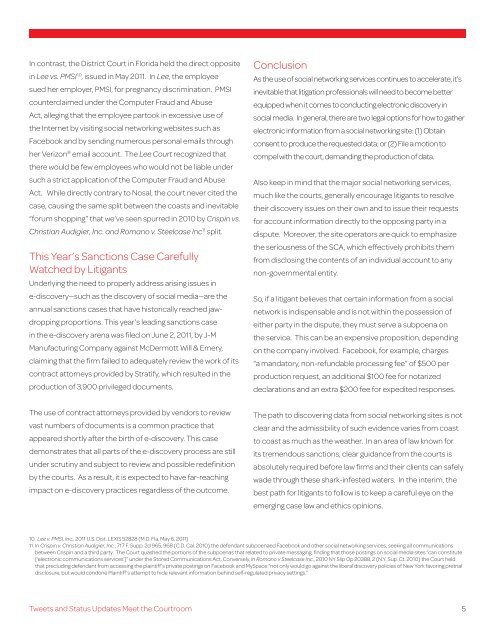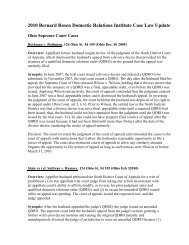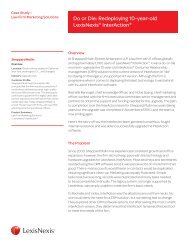Tweets and Status Updates Meet the Courtroom - Austin Bar ...
Tweets and Status Updates Meet the Courtroom - Austin Bar ...
Tweets and Status Updates Meet the Courtroom - Austin Bar ...
Create successful ePaper yourself
Turn your PDF publications into a flip-book with our unique Google optimized e-Paper software.
In contrast, <strong>the</strong> District Court in Florida held <strong>the</strong> direct opposite<br />
in Lee vs. PMSI 10 , issued in May 2011. In Lee, <strong>the</strong> employee<br />
sued her employer, PMSI, for pregnancy discrimination. PMSI<br />
counterclaimed under <strong>the</strong> Computer Fraud <strong>and</strong> Abuse<br />
Act, alleging that <strong>the</strong> employee partook in excessive use of<br />
<strong>the</strong> Internet by visiting social networking websites such as<br />
Facebook <strong>and</strong> by sending numerous personal emails through<br />
her Verizon ® email account. The Lee Court recognized that<br />
<strong>the</strong>re would be few employees who would not be liable under<br />
such a strict application of <strong>the</strong> Computer Fraud <strong>and</strong> Abuse<br />
Act. While directly contrary to Nosal, <strong>the</strong> court never cited <strong>the</strong><br />
case, causing <strong>the</strong> same split between <strong>the</strong> coasts <strong>and</strong> inevitable<br />
“forum shopping” that we’ve seen spurred in 2010 by Crispin vs.<br />
Christian Audigier, Inc. <strong>and</strong> Romano v. Steelcase Inc 11 split.<br />
This Year’s Sanctions Case Carefully<br />
Watched by Litigants<br />
Underlying <strong>the</strong> need to properly address arising issues in<br />
e-discovery—such as <strong>the</strong> discovery of social media—are <strong>the</strong><br />
annual sanctions cases that have historically reached jawdropping<br />
proportions. This year’s leading sanctions case<br />
in <strong>the</strong> e-discovery arena was filed on June 2, 2011, by J-M<br />
Manufacturing Company against McDermott Will & Emery,<br />
claiming that <strong>the</strong> firm failed to adequately review <strong>the</strong> work of its<br />
contract attorneys provided by Stratify, which resulted in <strong>the</strong><br />
production of 3,900 privileged documents.<br />
Conclusion<br />
As <strong>the</strong> use of social networking services continues to accelerate, it’s<br />
inevitable that litigation professionals will need to become better<br />
equipped when it comes to conducting electronic discovery in<br />
social media. In general, <strong>the</strong>re are two legal options for how to ga<strong>the</strong>r<br />
electronic information from a social networking site: (1) Obtain<br />
consent to produce <strong>the</strong> requested data; or (2) File a motion to<br />
compel with <strong>the</strong> court, dem<strong>and</strong>ing <strong>the</strong> production of data.<br />
Also keep in mind that <strong>the</strong> major social networking services,<br />
much like <strong>the</strong> courts, generally encourage litigants to resolve<br />
<strong>the</strong>ir discovery issues on <strong>the</strong>ir own <strong>and</strong> to issue <strong>the</strong>ir requests<br />
for account information directly to <strong>the</strong> opposing party in a<br />
dispute. Moreover, <strong>the</strong> site operators are quick to emphasize<br />
<strong>the</strong> seriousness of <strong>the</strong> SCA, which effectively prohibits <strong>the</strong>m<br />
from disclosing <strong>the</strong> contents of an individual account to any<br />
non-governmental entity.<br />
So, if a litigant believes that certain information from a social<br />
network is indispensable <strong>and</strong> is not within <strong>the</strong> possession of<br />
ei<strong>the</strong>r party in <strong>the</strong> dispute, <strong>the</strong>y must serve a subpoena on<br />
<strong>the</strong> service. This can be an expensive proposition, depending<br />
on <strong>the</strong> company involved. Facebook, for example, charges<br />
“a m<strong>and</strong>atory, non-refundable processing fee” of $500 per<br />
production request, an additional $100 fee for notarized<br />
declarations <strong>and</strong> an extra $200 fee for expedited responses.<br />
The use of contract attorneys provided by vendors to review<br />
vast numbers of documents is a common practice that<br />
appeared shortly after <strong>the</strong> birth of e-discovery. This case<br />
demonstrates that all parts of <strong>the</strong> e-discovery process are still<br />
under scrutiny <strong>and</strong> subject to review <strong>and</strong> possible redefinition<br />
by <strong>the</strong> courts. As a result, it is expected to have far-reaching<br />
impact on e-discovery practices regardless of <strong>the</strong> outcome.<br />
The path to discovering data from social networking sites is not<br />
clear <strong>and</strong> <strong>the</strong> admissibility of such evidence varies from coast<br />
to coast as much as <strong>the</strong> wea<strong>the</strong>r. In an area of law known for<br />
its tremendous sanctions, clear guidance from <strong>the</strong> courts is<br />
absolutely required before law firms <strong>and</strong> <strong>the</strong>ir clients can safely<br />
wade through <strong>the</strong>se shark-infested waters. In <strong>the</strong> interim, <strong>the</strong><br />
best path for litigants to follow is to keep a careful eye on <strong>the</strong><br />
emerging case law <strong>and</strong> ethics opinions.<br />
10. Lee v. PMSI, Inc., 2011 U.S. Dist. LEXIS 52828 (M.D. Fla. May 6, 2011)<br />
11. In Crispin v. Christian Audigier, Inc., 717 F. Supp. 2d 965, 968 (C.D. Cal. 2010) <strong>the</strong> defendant subpoenaed Facebook <strong>and</strong> o<strong>the</strong>r social networking services, seeking all communications<br />
between Crispin <strong>and</strong> a third party. The Court quashed <strong>the</strong> portions of <strong>the</strong> subpoenas that related to private messaging, finding that those postings on social media sites “can constitute<br />
[‘electronic communications services’]” under <strong>the</strong> Stored Communications Act. Conversely, in Romano v Steelcase Inc., 2010 NY Slip Op 20388, 2 (N.Y. Sup. Ct. 2010) <strong>the</strong> Court held<br />
that precluding defendant from accessing <strong>the</strong> plaintiff’s private postings on Facebook <strong>and</strong> MySpace “not only would go against <strong>the</strong> liberal discovery policies of New York favoring pretrial<br />
disclosure, but would condone Plaintiff’s attempt to hide relevant information behind self-regulated privacy settings.”<br />
<strong>Tweets</strong> <strong>and</strong> <strong>Status</strong> <strong>Updates</strong> <strong>Meet</strong> <strong>the</strong> <strong>Courtroom</strong> 5





